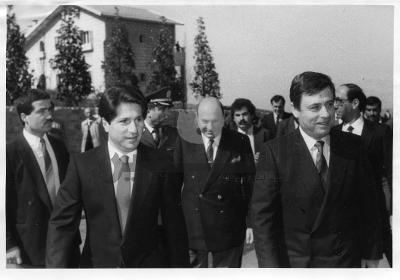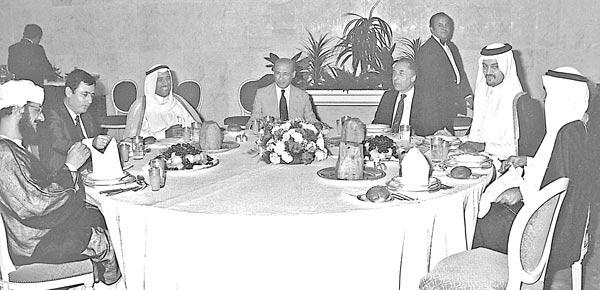Syria’s Foreign Minister today dismissed as ”ridiculous” Israel’s demands that the Syrians remove their SAM-6 antiaircraft missiles from Lebanon.
”Israel wants to have a free hand to send its fighter planes to attack Lebanon and drop tons and tons of bombs on the Lebanese,” the Foreign Minister, Abdel Halim Khaddam, said.
With tension mounting over the presence of the antiaircraft missiles in the Bekaa Valley, both the United States and the Soviet Union have been attempting to cool off their belligerent allies. But, at least publicly, Israel and Syria have remained adamant.
President Reagan announced today that the United States was sending Philip Habib, a former Assistant Secretary of State, to Jerusalem, Damascus and Beirut in hopes of defusing the crisis. The Soviet Union is sending a First Deputy Foreign Minister, Georgi M. Korniyenko, to Syria tomorrow.
The Syrians introduced the Soviet-built missile batteries into Lebanon last week after Israeli jets had shot down two Syrian helicopters attacking Lebanese Christian positions around Zahle. The Christians were building a road that the Syrians considered a strategic threat.
The fighting, which broke out at the beginning of April, spread from Zahle to Beirut. Schools were closed by shelling, there were artillery duels across the line that divides the city into Christian and Moslem sectors, and the airport has been closed for two weeks.
Despite occasional bursts of gunfire and shelling, a cease-fire has held for a week while Foreign Minister Khaddam of Syria conferred with leaders of Lebanon’s Maronite Catholic community and other factions. Talks With Sarkis Overshadowed
The crisis over the missiles overshadowed talks that Mr. Khaddam held today with President Elias Sarkis of Lebanon in hopes of ending this round of fighting and finding a settlement to the political chaos and violence.
Mr. Khaddam, who later returned to Damascus, said he was more optimistic, but sources in the Lebanese Christians’ Phalangist Party dismissed the Syrian’s talks as unlikely to produce anything.
The Maronites, who have taken a heavy pounding during the month of fighting, now seem emboldened by the prospect that their battle has taken on international implications.
”The Israelis will strike at the missiles,” a Phalangist official said. Pierre Gemayel, the party leader, attended the meeting with Mr. Khaddam at the presidential palace, but his son, Bachir, the party’s militia chief, did not.
The Syrians want the Phalangists to issue a statement renouncing any alliance with Israel as a precondition for any easing of the situation. The Phalangists, according to a party source, want a phased withdrawal of the Syrians from Lebanon, a guarantee of the safety of the Christian community and a new Lebanese government.
Government officials have been hoping to come up with a plan that would restore some measure of order such as the reopening of the airport and several passageways between the east and west sides of Beirut. The Christians want the Syrian siege of Zahle lifted and Lebanese Government soldiers stationed atop the mountains where Christian positions have been taken over by Syrians and their local Lebanese leftist allies.
Meanwhile, Palestinian leaders voiced fears that Israel was preparing for an invasion or some other major military move in the south. Yasir Arafat, the chairman of the Palestine Liberation Organization, flew to Damascus and then on to Riyadh, Saudi Arabia, where he met with King Khalid and the Saudi Cabinet.


